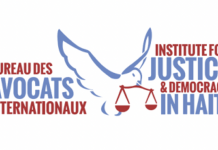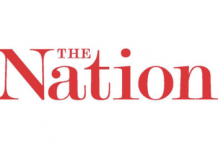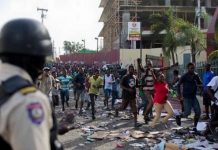by Yves
Pierre-Louis and Kim Ives (Haiti Liberte)
Pierre-Louis and Kim Ives (Haiti Liberte)
After
installing a new government led by Prime Minister Enex Jean-Charles, Haiti’s
interim president Jocelerme Privert has now passed a second hurdle: setting up
another Provisional Electoral Council (CEP) on Mar. 30, 2016. This is the sixth
CEP formed in the past four years.
installing a new government led by Prime Minister Enex Jean-Charles, Haiti’s
interim president Jocelerme Privert has now passed a second hurdle: setting up
another Provisional Electoral Council (CEP) on Mar. 30, 2016. This is the sixth
CEP formed in the past four years.
The new CEP has as its president Léopold Berlanger, formally the
representative of the National Association of Haitian Media (ANMH) and the
Association of Haiti’s Independent Media (AMIH). Berlanger is also the informal
representative of Haiti’s bourgeoisie and the so-called “Core Group,” the
ambassadors who follow U.S. leadership in Haiti.
representative of the National Association of Haitian Media (ANMH) and the
Association of Haiti’s Independent Media (AMIH). Berlanger is also the informal
representative of Haiti’s bourgeoisie and the so-called “Core Group,” the
ambassadors who follow U.S. leadership in Haiti.
The CEP’s vice-president is lawyer Carlos Hercule, who represents the
Catholic Church of Cardinal Chibly Langlois and Bishop Patrice Aris.
Catholic Church of Cardinal Chibly Langlois and Bishop Patrice Aris.
Marie
Frantz Joachim, the representative of Haitian Women Solidarity (SOFA), is
the CEP’s Secretary General, while Dr.
Frinel Joseph, representing Haiti’s Protestant sector, is the treasurer.
Frantz Joachim, the representative of Haitian Women Solidarity (SOFA), is
the CEP’s Secretary General, while Dr.
Frinel Joseph, representing Haiti’s Protestant sector, is the treasurer.
Haiti’s human rights sector,
represented by the Platform of Haitian Human Rights Organizations (POHDH) and
the National Human Rights Defense Network (RNDDH), nominated Jean Simon Saint-Hubert to the new CEP
while the Peasant and Vodou sector sent Kenson
Polynice. Marie-Herolle Michel represents
the business community on the new CEP, while Josette Jean Dorcely represents the trade union sector, and Lucien Jean-Bernard, the university
sector.
represented by the Platform of Haitian Human Rights Organizations (POHDH) and
the National Human Rights Defense Network (RNDDH), nominated Jean Simon Saint-Hubert to the new CEP
while the Peasant and Vodou sector sent Kenson
Polynice. Marie-Herolle Michel represents
the business community on the new CEP, while Josette Jean Dorcely represents the trade union sector, and Lucien Jean-Bernard, the university
sector.
Mr. Bernard was a member of the CEP
which organized the massively boycotted election of Jan. 17, 1988 that brought
to power President Leslie François Manigat. Four months after his Feb. 7, 1988
inauguration, Manigat was overthrown by the same general, Henri Namphy, who put
him in power. That 1988 CEP was chaired by Jean Gilbert, who held his election
less than two months after a Nov. 29, 1987 election was aborted after
paramilitary thugs macheted and shot to death dozens of would-be voters around
Haiti.
which organized the massively boycotted election of Jan. 17, 1988 that brought
to power President Leslie François Manigat. Four months after his Feb. 7, 1988
inauguration, Manigat was overthrown by the same general, Henri Namphy, who put
him in power. That 1988 CEP was chaired by Jean Gilbert, who held his election
less than two months after a Nov. 29, 1987 election was aborted after
paramilitary thugs macheted and shot to death dozens of would-be voters around
Haiti.
The new CEP is also trying to hold
an election in an extremely polarized and volatile political atmosphere. The
big question is this: will it annul the Aug. 9 and Oct. 25, 2015 rounds, as
demanded by Haiti’s people and most of the political class, or will it attempt to
hold a third round which accepts the results of the first two, as demanded by
the “Core Group”?
an election in an extremely polarized and volatile political atmosphere. The
big question is this: will it annul the Aug. 9 and Oct. 25, 2015 rounds, as
demanded by Haiti’s people and most of the political class, or will it attempt to
hold a third round which accepts the results of the first two, as demanded by
the “Core Group”?
Haiti’s leading presidential
candidates demand the formation of an independent commission of inquiry to
review the ballots and tally sheets of the Aug. 9 and Oct. 25 pollings, marred
by fraud and violence, to determine what the true results were, if that can
even be done. Many doubt it can.
candidates demand the formation of an independent commission of inquiry to
review the ballots and tally sheets of the Aug. 9 and Oct. 25 pollings, marred
by fraud and violence, to determine what the true results were, if that can
even be done. Many doubt it can.
If the independent investigation is
not carried out, it is doubtful that any major presidential candidate will
participate in the elections whose schedule the new CEP must establish.
not carried out, it is doubtful that any major presidential candidate will
participate in the elections whose schedule the new CEP must establish.
On Apr. 4, popular organizations and
students organized a sit-in in front of the National Palace and the Justice
Ministry to demand that in addition to an independent commission of electoral
verification, there be formed a commission to audit the management of three
funds.
students organized a sit-in in front of the National Palace and the Justice
Ministry to demand that in addition to an independent commission of electoral
verification, there be formed a commission to audit the management of three
funds.
First, they want an investigation of
the Interim Haiti Recovery Commission (IHRC), co-chaired by former U.S. Pres.
Bill Clinton, which decided how to spend about $13 billion in post-earthquake
international aid to Haiti.
the Interim Haiti Recovery Commission (IHRC), co-chaired by former U.S. Pres.
Bill Clinton, which decided how to spend about $13 billion in post-earthquake
international aid to Haiti.
Secondly, they want to know how over
$1.5 billion was spent by the government of President Michel Martelly out of
Haiti’s PetroCaribe account, where 40% of all state oil sales are parked to
provide capital for social welfare programs. Even Mary Barton-Dock, the World
Bank’s Special Envoy to Haiti, told the Financial
Times that “transparency in the use of PetroCaribe funds is minimal.”
Today, Haiti owes 86% of its foreign debt to Venezuela, and it has not paid the
60% of oil revenues it owes Venezuela up-front for over nine months.
$1.5 billion was spent by the government of President Michel Martelly out of
Haiti’s PetroCaribe account, where 40% of all state oil sales are parked to
provide capital for social welfare programs. Even Mary Barton-Dock, the World
Bank’s Special Envoy to Haiti, told the Financial
Times that “transparency in the use of PetroCaribe funds is minimal.”
Today, Haiti owes 86% of its foreign debt to Venezuela, and it has not paid the
60% of oil revenues it owes Venezuela up-front for over nine months.
Finally, Martelly and his Prime
Minister Laurent Lamothe established an illegal tax (it was never ratified by
Parliament) of $1.50 on every international money transfer and five cents on
every international phone call. The tax generated tens of millions of dollars
which have never been accounted for, although the money was supposed to be
“funding education.”
Minister Laurent Lamothe established an illegal tax (it was never ratified by
Parliament) of $1.50 on every international money transfer and five cents on
every international phone call. The tax generated tens of millions of dollars
which have never been accounted for, although the money was supposed to be
“funding education.”
The demonstrators also denounced the
interference of the Core Group, the UN Mission to Stabilize Haiti (MINUSTAH)
chief Sandra Honoré, U.S. Ambassador to Haiti Peter Mulrean, and Canadian
Ambassador Paula Caldwell St-Onge in Haiti’s internal affairs. Under the Vienna
Conventions on Diplomatic and Consular Relations, accredited diplomatic
representatives are formally prohibited from interfering in their host nation’s
internal affairs.
interference of the Core Group, the UN Mission to Stabilize Haiti (MINUSTAH)
chief Sandra Honoré, U.S. Ambassador to Haiti Peter Mulrean, and Canadian
Ambassador Paula Caldwell St-Onge in Haiti’s internal affairs. Under the Vienna
Conventions on Diplomatic and Consular Relations, accredited diplomatic
representatives are formally prohibited from interfering in their host nation’s
internal affairs.
In recent weeks, students mobilizing
at State University’s Faculty of Ethnology and the Faculty of Law have clashed
with the Haitian National Police (PNH), as they clashed with MINUSTAH troops
last year. Today, they say loud and clear that they will not obey the dictates
of the Core Group and Washington. If Leopold Berlanger allows his CEP to be
used by Washington like that of his predecessor of Pierre-Louis Opont, he will
suffer the same fate of having to resign in disgrace, they say.
at State University’s Faculty of Ethnology and the Faculty of Law have clashed
with the Haitian National Police (PNH), as they clashed with MINUSTAH troops
last year. Today, they say loud and clear that they will not obey the dictates
of the Core Group and Washington. If Leopold Berlanger allows his CEP to be
used by Washington like that of his predecessor of Pierre-Louis Opont, he will
suffer the same fate of having to resign in disgrace, they say.
Interim President Jocelerme Privert
and Prime Minister Enex Jean-Charles are also not immune from popular anger if
they don’t establish commissions to verify Martelly’s elections and audit his
finances, demonstrators say.
and Prime Minister Enex Jean-Charles are also not immune from popular anger if
they don’t establish commissions to verify Martelly’s elections and audit his
finances, demonstrators say.





